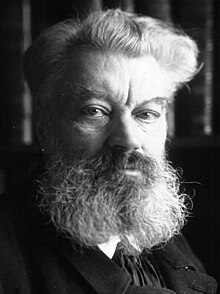Camille Pelletan

Charles Camille Pelletan (28 June 1846 – 4 June 1915) was a
Biography
Pelletan was born in Paris, the son of Eugène Pelletan (1813–1884), a writer of some distinction and a noted opponent of the Second Empire.[1]
Camille Pelletan was educated in Paris, passed as licentiate in laws, and studied at the
During the
He was nominated as
- Caricatures of Camille Pelletan, 1904

the year before he died
On the fall of the Combes ministry he became less prominent in French politics.
Camille Pelletan's name was given to the
The Pelletan's family tree includes 11 parliamentaries, among whom are Georges Bonnet and Michel Debré.
US Naval officer Rear Admiral Bradley A. Fiske wrote of Pelletan in his autobiography From Midshipman to Rear Admiral, edited in 1919, that:
Instead of being a friend of the people, as so many French people thought, Camille Pelletan by his course was more dangerous to them than all the German spies in France put together. Camille Pelletan's course did more to break down the defense of the French Republic than a half a million German troops could have done.[5]
References
- ^ a b c d Chisholm 1911, p. 69.
- ^ Robert, Adolphe; Cougny, Gaston (1889–1891), "GAULIER (ALFRED-NICOLAS)", in Edgar Bourloton (ed.), Dictionnaire des Parlementaires français (1789–1889) (in French), retrieved 2018-01-26
- ^ Chisholm 1911, pp. 69–70.
- ^ Chisholm 1911, p. 70.
- ^ Bradley Allen Fiske (1919). From Midshipman to Rear-Admiral. Century Company.
Attribution:
- This article incorporates text from a publication now in the public domain: Chisholm, Hugh, ed. (1911). "Pelletan, Charles Camille". Encyclopædia Britannica. Vol. 21 (11th ed.). Cambridge University Press. pp. 69–70.
Further reading
- Stone, Judith F. Sons of the Revolution: Radical Democrats in France, 1862-1914. Baton Rouge: Louisiana State University Press, 1996. ISBN 0807120200
- Touroude, Georges. Deux républicains de progrès: Eugène et Camille Pelletan. Paris: L'Harmattan, 1995. ISBN 273843309X



